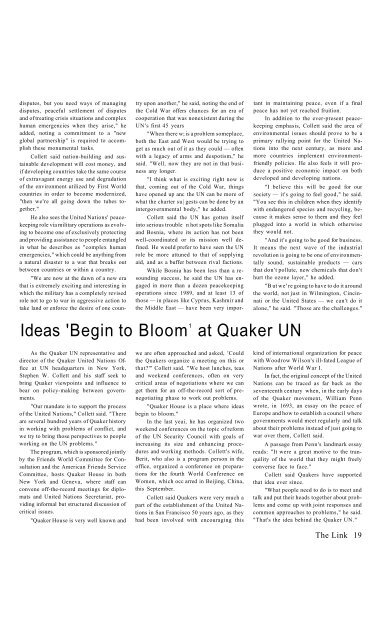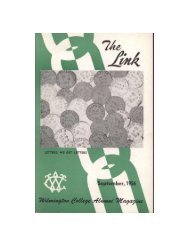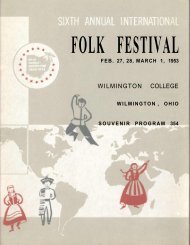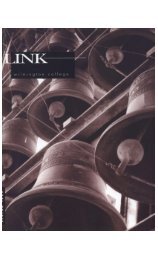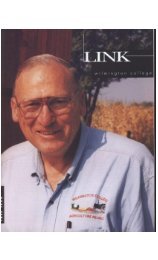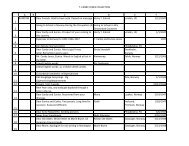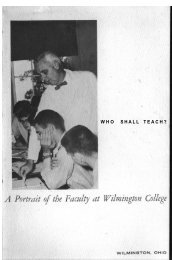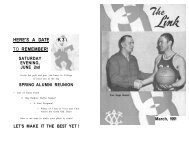Link 1995 10 (Vol. 45, No. 3).pdf - DRC Home - Wilmington College
Link 1995 10 (Vol. 45, No. 3).pdf - DRC Home - Wilmington College
Link 1995 10 (Vol. 45, No. 3).pdf - DRC Home - Wilmington College
Create successful ePaper yourself
Turn your PDF publications into a flip-book with our unique Google optimized e-Paper software.
disputes, but you need ways of managing<br />
disputes, peaceful settlement of disputes<br />
and of treating crisis situations and complex<br />
human emergencies when they arise," he<br />
added, noting a commitment to a "new<br />
global partnership" is required to accomplish<br />
these monumental tasks.<br />
Collett said nation-building and sustainable<br />
development will cost money, and<br />
if developing countries take the same course<br />
of extravagant energy use and degradation<br />
of the environment utilized by First World<br />
countries in order to become modernized,<br />
"then we're all going down the tubes together."<br />
He also sees the United Nations' peacekeeping<br />
role via military operations as evolving<br />
to become one of exclusively protecting<br />
and providing assistance to people entangled<br />
in what he describes as "complex human<br />
emergencies," which could be anything from<br />
a natural disaster to a war that breaks out<br />
between countries or within a country.<br />
"We are now at the dawn of a new era<br />
that is extremely exciting and interesting in<br />
which the military has a completely revised<br />
role not to go to war in aggressive action to<br />
take land or enforce the desire of one coun<br />
try upon another," he said, noting the end of<br />
the Cold War offers chances for an era of<br />
cooperation that was nonexistent during the<br />
UN's first <strong>45</strong> years<br />
"When there w; is a problem someplace,<br />
both the East and West would be trying to<br />
get as much out of it as they could — often<br />
with a legacy of arms and despotism," he<br />
said. "Well, now they are not in that business<br />
any longer.<br />
"I think what is exciting right now is<br />
that, coming out of the Cold War, things<br />
have opened up anc the UN can be more of<br />
what the charter su| gests can be done by an<br />
intergovernmental body," he added.<br />
Collett said the UN has gotten itself<br />
into serious trouble n hot spots like Somalia<br />
and Bosnia, where its action has not been<br />
well-coordinated or its mission well defined.<br />
He would prefer to have seen the UN<br />
role be more attuned to that of supplying<br />
aid, and as a buffer between rival factions.<br />
While Bosnia has been less than a resounding<br />
success, he said the UN has engaged<br />
in more than a dozen peacekeeping<br />
operations since 1989, and at least 13 of<br />
those — in places like Cyprus, Kashmir and<br />
the Middle East — have been very impor<br />
Ideas 'Begin to Bloom 1<br />
As the Quaker UN representative and<br />
director of the Quaker United Nations Office<br />
at UN headquarters in New York,<br />
Stephen W. Collett and his staff seek to<br />
bring Quaker viewpoints and influence to<br />
bear on policy-making between governments.<br />
"Our mandate is to support the process<br />
of the United Nations," Collett said. "There<br />
are several hundred years of Quaker history<br />
in working with problems of conflict, and<br />
we try to bring those perspectives to people<br />
working on the UN problems."<br />
The program, which is sponsored jointly<br />
by the Friends World Committee for Consultation<br />
and the American Friends Service<br />
Committee, hosts Quaker House in both<br />
New York and Geneva, where staff can<br />
convene off-the-record meetings for diplomats<br />
and United Nations Secretariat, providing<br />
informal but structured discussion of<br />
critical issues.<br />
"Quaker House is very well known and<br />
we are often approached and asked, 'Could<br />
the Quakers organize a meeting on this or<br />
that?'" Collett said. "We host lunches, teas<br />
and weekend conferences, often on very<br />
critical areas of negotiations where we can<br />
get them for an off-the-record sort of prenegotiating<br />
phase to work out problems.<br />
"Quaker House is a place where ideas<br />
begin to bloom."<br />
In the last yeai, he has organized two<br />
weekend conferences on the topic of reform<br />
of the UN Security Council with goals of<br />
increasing its size and enhancing procedures<br />
and working methods. Collett's wife,<br />
Berit, who also is a program person in the<br />
office, organized a conference on preparations<br />
for the fourth World Conference on<br />
Women, which occ arred in Beijing, China,<br />
this September.<br />
Collett said Quakers were very much a<br />
part of the establishment of the United Nations<br />
in San Francisco 50 years ago, as they<br />
had been involved with encouraging this<br />
at Quaker UN<br />
tant in maintaining peace, even if a final<br />
peace has not yet reached fruition.<br />
In addition to the ever-present peacekeeping<br />
emphasis, Collett said the area of<br />
environmental issues should prove to be a<br />
primary rallying point for the United Nations<br />
into the next century, as more and<br />
more countries implement environmentfriendly<br />
policies. He also feels it will produce<br />
a positive economic impact on both<br />
developed and developing nations.<br />
"I believe this will be good for our<br />
society — it's going to feel good," he said.<br />
"You see this in children when they identify<br />
with endangered species and recycling, because<br />
it makes sense to them and they feel<br />
plugged into a world in which otherwise<br />
they would not.<br />
"And it's going to be good for business.<br />
It means the next wave of the industrial<br />
revolution is going to be one of environmentally<br />
sound, sustainable products — cars<br />
that don't pollute, new chemicals that don't<br />
hurt the ozone layer," he added.<br />
"B ut we' re going to have to do it around<br />
the world, not just in <strong>Wilmington</strong>, Cincinnati<br />
or the United States — we can't do it<br />
alone," he said. "Those are the challenges."<br />
kind of international organization for peace<br />
with Woodrow Wilson's ill-fated League of<br />
Nations after World War I.<br />
In fact, the original concept of the United<br />
Nations can be traced as far back as the<br />
seventeenth century when, in the early days<br />
of the Quaker movement, William Penn<br />
wrote, in 1693, an essay on the peace of<br />
Europe and how to establish a council where<br />
governments would meet regularly and talk<br />
about their problems instead of just going to<br />
war over them, Collett said.<br />
A passage from Penn's landmark essay<br />
reads: "It were a great motive to the tranquility<br />
of the world that they might freely<br />
converse face to face."<br />
Collett said Quakers have supported<br />
that idea ever since.<br />
"What people need to do is to meet and<br />
talk and put their heads together about problems<br />
and come up with joint responses and<br />
common approaches to problems," he said.<br />
"That's the idea behind the Quaker UN."<br />
The <strong>Link</strong> 19


